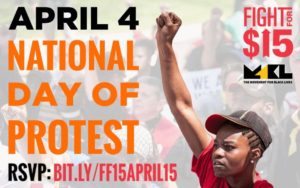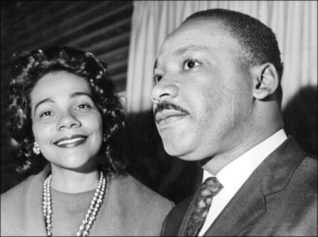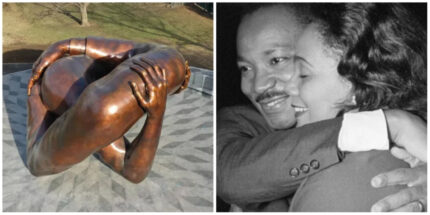
African-Americans and Latinos comprise an overwhelming majority of the workforce in low-wage industries like fast food. Image courtesy of Twitter.
The Black Lives Matter movement is looking to tackle yet another social justice issue: fair, livable wages.
A band of Black Lives Matter groups and the organization leading the charge for the $15-per-hour minimum wage are teaming up to continue the struggle for racial justice and economic equality. Just as the Rev. Dr. Martin Luther King Jr. fought to connect the two pressing issues in his final years of life, BLM and the Fight for $15 are set to launch their first nationwide joint action on Tuesday, April 4.
The groups’ “Fight Racism, Raise Pay” efforts, which will fall on the 49th anniversary of King’s assassination, will be marked by organized protests in two dozen cities, including Milwaukee, Atlanta, Memphis, Chicago, Boston, Denver and Las Vegas, the Associated Press reported. The civil rights icon was shot and killed in Memphis while in town supporting sanitation workers on strike in 1968.
“When MLK was assassinated, he was talking to workers who were dealing with union-busting [and] unfair wages,” Kendall Fells, organizing director for the Fight for $15, told the wire service. “The bottom line is that every day, workers of color across the country face deep-seated racism that would seem to be out of Dr. King’s era, but sadly it is still happening today.”
Breaking: April 4 we are joining forces with @mvmt4bl @btmmayday for nationwide events https://t.co/4eiHoTcE0z #BeyondTheMoment #Fightfor15 pic.twitter.com/FszpxLPisR
— Fight for a Union (@FightForAUnion) March 24, 2017
Thousands of underpaid workers, local activists, elected officials and clergy are expected to converge at local rallies, marches, teach-ins and other demonstrations from coast to coast. Those protests will then culminate in a march by thousands of laborers, civil rights leaders and politicians at the Lorraine Motel where they’ll hold a memorial at the site of Dr. King’s assassination, according to a press release.
The organized action comes in the wake of President Donald Trump’s election, prompting some social justice and civil rights groups to push back against an administration they deem to be hostile toward working-class and nonwhite Americans. Activists say that by joining together, the two groups will be able to reach more people and magnify their message.
Fight for $15 and Black Lives Matter first came together in Ferguson where the city’s predominately Black workforce at the local McDonald’s has been on strike since before the police shooting of 18-year-old Michael Brown, according to the Associated Press. Since the shooting, workers there have not only organized to protest unfair wages but to challenge police department practices as well.
“We’re joining together with the Movement for Black Lives because our two movements have a common bond in fighting the racism that keeps down people of color everywhere,” said Latierika Blair, 23, who works at McDonald’s in Memphis making just $7.35 an hour. “McDonald’s conspires with police to try to silence us when we speak out for higher pay.
“Corporations and politicians act to keep workers and Black people from getting ahead in America,” Blair continued. “We should be investing in our people and communities. That’s why we have to protest and that’s why we will keep speaking out together until we win.”
According to a recent analysis by the National Employment Law Project, nonwhite Americans are alarmingly overrepresented in low-paying industries like fast food. Moreover, more than half of African-Americans and nearly 60 percent of Latino workers earn less than $15 per hour.
In 1961, Dr. King saw a common link between the struggle for labor and civil rights, declaring that “the two most dynamic and cohesive liberal forces in the country are the labor movement and the Negro freedom movement. Together, we can be architects of democracy.” The Fight for $15 and BLM actions will close with a national moment of silence on April 4 at 6:01 p.m. Central time, marking the exact time King was shot and killed.
“Dr. King spent his final days standing with Memphis sanitation workers because he saw the deep link between the labor movement and the civil rights movement,” said the Rev. William Barber II, founder of the social justice group Repairers of the Breach. “Dr. King knew that if racism and poverty are inextricably linked, our struggles to confront them must be inseparable as well.”
Organizations participating in next month’s efforts include Black Lives Matter chapters in Atlanta, Los Angeles and Flint, Michigan; NAACP branches in Missouri, North Carolina and Virginia, and other groups like Black Youth Project 100 and Dream Defenders in Tampa, Fla.


